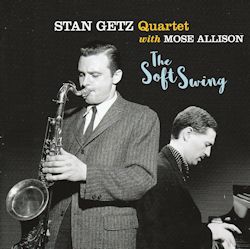Stan Getz, who passed away in 1991, will always
be remembered as one of the great jazz tenor sax players, rooted firmly
in the school of Lester Young. He was also one of the most successful
musicians commercially during his lifetime, thanks to his involvement
in the Bossa Nova wave which brought together jazz and Brazilian samba,
to universal popular acclaim. This particular album has curiosity
value in that it features the only studio album Getz made with the
Mississippi-born pianist and songwriter Mose Allison. Allison was
subsequently to become known as a singer, too. There are some additional
tracks included of radio broadcasts of the Getz Quartet, with Allison
on piano, playing at the Village Vanguard in New York and the Red
Hill Inn in Pennsauken, New Jersey. A cautionary note here. The quality
of the radio broadcast recordings is much more satisfactory for the
Red Hill Inn than for the Village Vanguard. Allison's piano sounds
positively tinny on tracks such as All God's Children Got Rhythm
and Flamingo. Allison's piano style could be described as
comprehensive in its breadth. His own successful first album Back
Country Suite was released in 1957 and he was to form his own
trio in 1958 so his time with Getz was limited (February 1957 into
1958). They did, however, also team up as a duo for a month in Copenhagen
in 1959. The quartet on The Soft Swing album and on a couple
of tracks from the Village Vanguard was completed by Addison Farmer
and Jerry Segal. Addison Farmer, the bassist, was the twin brother
of trumpeter Art Farmer. Sadly, Addison died aged only 34, less than
seven years after these sessions. Jerry Segal was a bop-influenced
drummer who also worked with Mose Allison 1959-60.
So, what are we to make of this disc? The Soft Swing album maintains a high standard throughout. My personal favourite would be the ballad To The Ends Of The Earth which features Getz at his lushest and is notable, too, for Farmer's bass solo and his interplay with Segal. A couple of
the tunes are written by Getz. The most successful of these is probably Down Beat which swings nicely, full speed ahead, with Allison crisp and
incisive on piano. Pocono Mac, the longest track on the CD, has a focussed
performance by Getz in what is a lenghty exploration of the theme, Allison offering lucid support and Segal too in good form. All The Things You Are is totally accessible, the group giving this familiar standard a thorough work-over. Bye Bye Blues has Stan Getz
weaving his way around the tune with accomplished ease.
We actually hear Stan's voice introducing the first of the radio recordings and providing links for most of the others. Good though it is to hear him, he
wrongly attributes All God's Children Got Rhythm to Gershwin. Apart from the quality of reproduction in some cases, the radio bonus tracks are, in
addition, variable. Is It True What They Say About Dixie? is something of an oddity. There's a mere snatch of Bronx Blues (thirty six
seconds!). The second version of To The Ends Of The Earth is not a patch on the first, despite a decent solo from Allison. It also suffers from a
noisy audience. Nevertheless, there are still considerable pleasures to be found in the clutch of standards, mainly ballads, which remain. Tunes such asTime After Time, Stars Fell On Alabama and Lover Man are treated with tenderness and lyricism, while on Duke Jordan's Jordu, Getz sounds positively effortless. The final track, composed by Mose Allison, is performed by piano, bass and drums (Paul Motian on the
latter, at that time in his mid 20s). Getz introduces it, however, and the liner notes tells us Stan used the title of the song (Ain't You A Mess)
as a put-down if any of the audience misbehaved.
It's good to have this reissue and the surviving radio broadcasts, to remind us again of that old Getz magic. Mose Allison, along for the ride, is a bonus.
Although his influences supposedly included Al Haig and John Lewis, he is well on his way on this disc to becoming his own man. Together with the other
quartet members, they provide an evocative reminder of fifties jazz.
James Poore
1. All The Things You Are
2. Pocono Mac
3. Down Beat
4. To The Ends Of The Earth
5. Bye Bye Blues
6. All God's Children Got Rhythm
7. Flamingo
8. Is It True What They Say About Dixie?
9. Time After Time
10. To The Ends Of The Earth - Second Version
11. Stars Fell On Alabama
12. Polka Dots And Moonbeams
13. Bronx Blues (Theme)
14. Jordu
15. Lover Man
16. Ain't You A Mess
Stan Getz - Tenor sax (tracks 1-15)
Mose Allison - Piano
Addison Farmer - Bass (tracks 1-7)
Jug Taylor - Bass (tracks 8-11, 13-16)
Willie Stump - Bass (track 12)
Jerry Segal - Drums (tracks 1-7)
Fred Benito - Drums (tracks 8-11)
Frank Isola - Drums (track 12)
Paul Motian - Drums (tracks 13-16)
